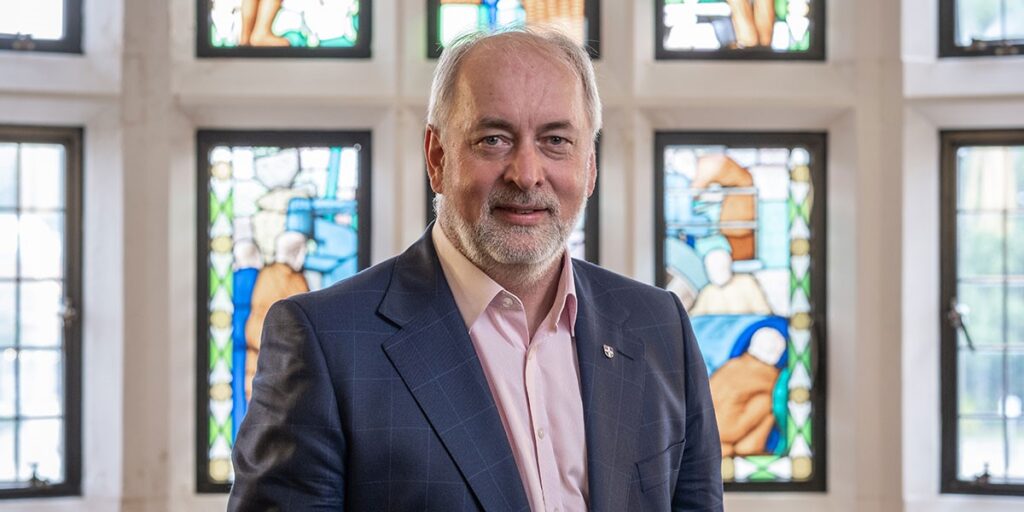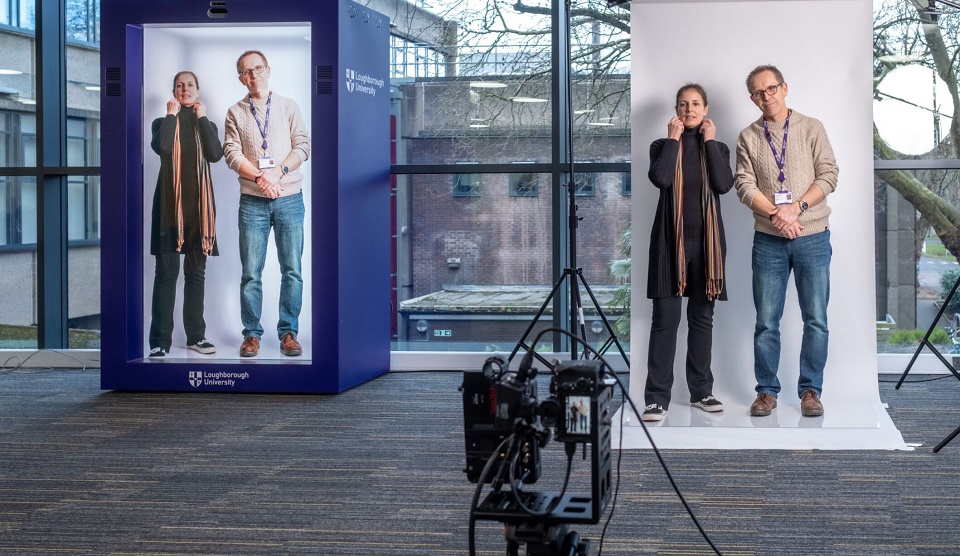From the Vice-Chancellor – January 2024

In my first newsletter of 2024: Looking ahead to the coming year, technology to enhance the student experience, outcomes from the Staff Experience Survey, research to address regional health inequalities and a Living Well inquiry.
A look ahead through 2024
I want to begin my first newsletter of 2024 by looking ahead to some of the exciting developments and events that will happen this year.
In March, Professor Dan Parsons, Pro Vice-Chancellor for Research and Innovation (R&I), and Jennifer Johnson, Director of R&I, will hold a series of roadshows to enable staff to learn more about the University’s R&I vision, as outlined in the core plan. The plan for Equity, Diversity and Inclusion (EDI) is expected in the spring, with the Sporting Excellence and Opportunity core plan due in the summer.
The University Sustainability Strategy, which is being led by the Associate Pro Vice-Chancellors (APVCs) for Climate Change and Net Zero, Dr Kathryn North and Professor John Downey, is due in the spring. The strategy will guide the delivery of the objectives within our Climate Change and Net Zero theme and cover all aspects of University life, from our research and innovation to the way we develop and manage our facilities and estates.
In the autumn we’ll admit our first cohort of ONCAMPUS Loughborough students to our undergraduate and taught postgraduate programmes. The ONCAMPUS initiative – which delivers academic programmes through our partnership with Cambridge Education Group, to prepare international students for progression into university – is a key action within our International Engagement and Impact core plan.
From July to September, we’ll be cheering on a delegation of Loughborough-linked athletes at the Paris 2024 Olympic and Paralympic Games. In the build up to the Games, the University will host ‘kitting out’ for ParalympicsGB athletes and support staff, who’ll collect their official Adidas kit from the Loughborough campus before heading off to Paris.
And at some point this year we’re likely to have a General Election, providing an opportunity for academics in the Centre for Research in Communication and Culture to again undertake news audits of the coverage, showcasing our research expertise across the country and beyond. It’s certainly going to be another busy year.

Holoportation technology to enhance students’ educational experience
It’s always good to see Loughborough described as ‘trailblazing’, which is how The Guardian reported our use of the new holoportation technology being piloted on campus. We are the first university in the UK to incorporate this AI-powered tech that projects lifelike avatars into our education offering.
The technology enables us to live-beam guest speakers from global universities and industry into lectures to give talks and answer students’ questions, just as if they were in the room together, giving students and staff access to professionals they may not otherwise have the chance to engage with.
It can be used for presenting 3D digital objects for close inspection as they can be rotated and studied in more detail than through current methods. Similarly, students will be able to showcase their own work – such as product designs or fashion shows – to broader audiences.
We will also be able to use the tech to present pre-recorded messages and talks, from industry partners and alumni, for instance, and provide interactive guidance and information for prospective students, their parents and guardians at recruitment events, such as the University open days. We have already used the technology to capture our Chancellor Seb Coe, giving a ‘virtual’ welcome to those who’ll attend our next open days.
The new technology will significantly enhance the learning experience for our students and aligns with our strategic aims to strengthen our sector-leading student experience through the use of the latest digital technologies. The technology could also contribute to our sustainability strategy as part of our Climate Change and Net Zero strategic theme by removing the need to fly in guest speakers and reducing the amount of materials used by students in building their prototype designs.

Results of the 2023 Staff Experience Survey
Last November we undertook our second Staff Experience Survey to gain an insight into how colleagues feel about working at the University. More than 2,300 people completed the survey – approximately 62% of the staff population. Thank you to all those who took the time to share their experiences. Your feedback will help us to understand what we’re doing well and, importantly, where we could improve.
The survey questions were grouped under nine themes: purpose, our values, autonomy, enablement, leadership, reward and recognition, wellbeing, EDI (equity, diversity and inclusion) and engagement. Overall scores for all the themes showed improvements compared to the 2022 staff experience survey, with ‘autonomy’ and ‘leadership’ showing the largest increases, of three points each, in favourable responses. The ‘purpose’ theme had the highest overall score, with 81% of respondents responding favourably.
This year, we included questions on our values: 76% of respondents said they understood the University values and 50% said they saw the values being upheld in other’s behaviour.
We have also been able to benchmark the University’s performance against that of other UK universities. Loughborough exceeds the higher education benchmark in six themes, however feedback on ‘our values’, ‘wellbeing’, and ‘reward and recognition’ scored slightly lower than the benchmark data.
Further details of the results – including a breakdown of the response rates across the Schools and Professional Services and the responses for each question – will be made available online shortly.
The results of the survey are certainly pleasing, but we are aware that there are areas that need to be addressed to improve our staff experience. Project Expectations, for example, has a dedicated workstream linked to ‘reward and recognition’ – through this we are reviewing the benefits we offer, following the Employee Benefits Survey we undertook in September 2023; we have undertaken a benchmarking exercise on pay; begun to roll-out a new long-service awards initiative; and expanded the annual Vice-Chancellor Awards, which recognise the incredible work of staff across the institution.
Through the workstreams linked to leadership we are reviewing the line management structure in Schools, have implemented termly General Assemblies, and revised the PDR process.
At a local level, the leadership teams in Schools and Professional Services will be sharing results for their areas with their staff and be required to develop and implement their own action plans in response to the feedback from the survey.

Working in partnership to tackle regional health inequalities
The government-funded National Institute for Health and Care Research (NIHR) has awarded £5.25m to the Public Health team at Leicestershire County Council, to enable the council to work with universities in the East Midlands, including Loughborough, to look at ways to reduce health inequalities across the county.
The funding will enable us to continue our impactful research that will change lives for the better. Loughborough’s participation in the initiative is being spearheaded by Professor Lauren Sherar from the School of Sport, Exercise and Health Sciences.
With high levels of asthma, cancer, obesity and heart disease across the county, the research will hopefully contribute to a reduction in these conditions and the causes of inequality. The priorities for the research will be identified by communities within Leicestershire to ensure that the research is relevant and meaningful to local areas and the inequalities they face. The research and resulting action will then become part of the day-to-day business of the council to bring about sustained culture change.
The funding has been awarded through the NIHR’s Health Determinants Research Collaborations (HDRC), which use research findings to understand how decisions impact on health and health inequalities. This important work maps directly on the University’s strategic aim of delivering improvements to public health and wellbeing. It also aligns to the Health, Wellbeing and Sport theme of the Universities Partnership initiative – a civic agreement between Loughborough, De Montfort and Leicester universities, as well as the city and counties of Leicester, Leicestershire and Rutland, to work together for the benefit of local people and the prosperity of the region.
Living Well inquiry launched by the Policy Unit
Next month the University’s Policy Unit will launch a Living Well Inquiry, looking into what is needed to live well in 21st century Britain. It aims to bring together research from a variety of disciplines throughout the University under one overarching banner to provide a guide for action for the next government.
The Inquiry will have four key themes – Smart Living, Clean Living, Healthy Living and Dignified Living. Researchers from across the University will be able to contribute to the Inquiry by using their research, attending events and participating in podcasts, for instance.
Two Co-Fellows have been appointed to run the inquiry – Dr Holly Collison-Randall, a Senior Lecturer in the Institute for Sports Business at Loughborough University London, and Dr Mark Monaghan, a Reader in Criminology in the School of Social Sciences and Humanities.
The Inquiry is an opportunity for Loughborough to drive new thinking about Living Well, influence debate by influential groups, and promote the interdisciplinary and innovative research being conducted across our three strategic themes. The Living Well Inquiry work programme is currently in development. If you wish to take part, please contact the Policy Unit team.
Vice-Chancellor's Communications
Opinions and comment from the Vice-Chancellor, Professor Nick Jennings

